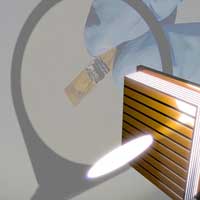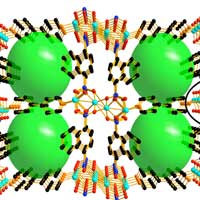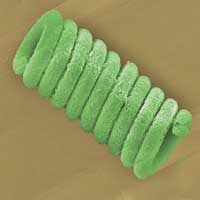 Extremely energy-efficient artificial intelligence is now closer to reality after researchers found a way to improve the accuracy of a brain-inspired computing system.
Extremely energy-efficient artificial intelligence is now closer to reality after researchers found a way to improve the accuracy of a brain-inspired computing system.
Thursday, August 27, 2020
Brain-inspired electronic system could vastly reduce AI's carbon footprint
 Extremely energy-efficient artificial intelligence is now closer to reality after researchers found a way to improve the accuracy of a brain-inspired computing system.
Extremely energy-efficient artificial intelligence is now closer to reality after researchers found a way to improve the accuracy of a brain-inspired computing system.
Photonics researchers report breakthrough in miniaturizing light-based chips
 Using a material widely adopted by photonics researchers, researchers have created the smallest electro-optical modulator yet. The modulator is a key component of a photonics-based chip, controlling how light moves through its circuits.
Using a material widely adopted by photonics researchers, researchers have created the smallest electro-optical modulator yet. The modulator is a key component of a photonics-based chip, controlling how light moves through its circuits.
Tying knots with individual molecules
 Chemists have successfully tied a series of microscopic knots using individual molecules for the first time, ushering in the advent of a form of nano-scale weaving which could create a new generation of advanced materials.
Chemists have successfully tied a series of microscopic knots using individual molecules for the first time, ushering in the advent of a form of nano-scale weaving which could create a new generation of advanced materials.
Music goes terahertz: Scientists achieve breakthrough for pulsed terahertz lasers
 By mixing electronic resonances in semiconductor nanostructures with the photon field of microresonators, researchers designed a stained mirror that bleaches more easily than ever and could make terahertz lasers ultrafast.
By mixing electronic resonances in semiconductor nanostructures with the photon field of microresonators, researchers designed a stained mirror that bleaches more easily than ever and could make terahertz lasers ultrafast.
Molecular architecture: New class of materials for tomorrow's energy storage
 The materials belong to the class of metal-organic frameworks, or MOFs for short, and could open up new opportunities for energy storage.
The materials belong to the class of metal-organic frameworks, or MOFs for short, and could open up new opportunities for energy storage.
Mini power plants from coated blue-green algae
 Scientists have equipped these humble unicellular organisms with semiconductor coatings to create mini power plants, which supply biofuels and are photocatalytically active in sunlight.
Scientists have equipped these humble unicellular organisms with semiconductor coatings to create mini power plants, which supply biofuels and are photocatalytically active in sunlight.
Subscribe to:
Comments (Atom)
